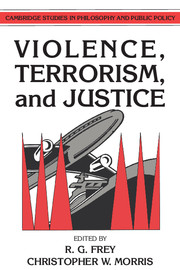Book contents
- Frontmatter
- Contents
- List of contributors
- Preface
- 1 Violence, terrorism, and justice
- 2 What purposes can “international terrorism” serve?
- 3 Violent demonstrations
- 4 Terrorism, rights, and political goals
- 5 The political significance of terrorism
- 6 Terrorism and morality
- 7 Which are the offers you can't refuse?
- 8 Making exceptions without abandoning the principle: or how a Kantian might think about terrorism
- 9 State and private; Red and White
- 10 State terrorism
- 11 Nuclear hostages
- 12 Rape as a terrorist institution
6 - Terrorism and morality
Published online by Cambridge University Press: 05 June 2012
- Frontmatter
- Contents
- List of contributors
- Preface
- 1 Violence, terrorism, and justice
- 2 What purposes can “international terrorism” serve?
- 3 Violent demonstrations
- 4 Terrorism, rights, and political goals
- 5 The political significance of terrorism
- 6 Terrorism and morality
- 7 Which are the offers you can't refuse?
- 8 Making exceptions without abandoning the principle: or how a Kantian might think about terrorism
- 9 State and private; Red and White
- 10 State terrorism
- 11 Nuclear hostages
- 12 Rape as a terrorist institution
Summary
DEFINITIONS
The interest in terrorism is centrally due to its involving a particularly distasteful subset of what is already a fairly distasteful group of human actions, namely violent ones. Which ones are they?
The term “violence” has known ambiguities. A murderer who stabs or shoots his victim has performed a violent act, certainly. But should we say the same thing of a murderer who lulls his victim to permanent slumber with a gentle and pleasant-tasting poison? Does the victim of a would-be murderer who defends himself by killing his assailant commit violence? I will not attempt to capture the precise nuances of ordinary language here, if that is indeed possible, but instead will simply identify as “violence” those intentional human acts whose immediate aim is the infliction of pain, bodily harm, damage, severe distress, or death on other persons. Law enforcers who shoot and kill in the course of their duties, however justified in doing so, will be said in this sense to have defended themselves with violence – probably not something that would ordinarily be said. Thus violence may, in principle, be either unjustified or justified, either evil or good in its upshot; calling an act “violence” does not morally judge it, in the usage adopted here.
To term terrorist acts a “subset” of violent ones may be misleading in one major respect. Much of what is generally regarded as terrorism consists not directly in the performance of violent acts but in the threat of such performance.
- Type
- Chapter
- Information
- Violence, Terrorism, and Justice , pp. 116 - 169Publisher: Cambridge University PressPrint publication year: 1991
- 13
- Cited by



